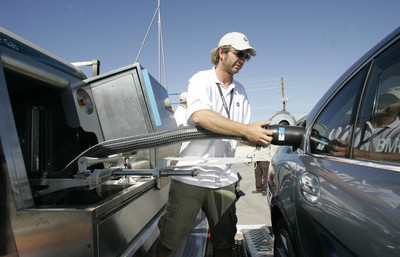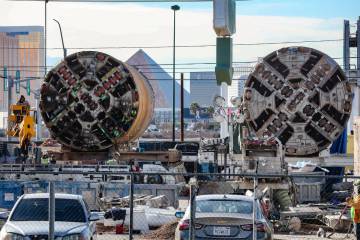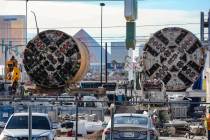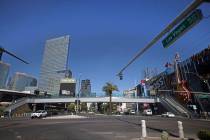Hydrogen-powered vehicles on way
I can tell you there is nothing futuristic about vehicles that run on hydrogen, because I drove one just the other day.
On Thursday, the 2008 Hydrogen Road Tour, sponsored by auto manufacturers and the U.S. government, visited the Las Vegas Valley Water District, partly to raise awareness about hydrogen-powered vehicles, but mainly because the agency has a hydrogen fueling station.
You see, not every city does yet.
And because our city does, I was allowed to take for a spin a Toyota Highlander that had been fixed up to run on hydrogen.
The idea of letting me drive a vehicle into which Toyota has probably invested millions of dollars intrigued me at first.
I don't have the best driving record. At least not one that justifies driving a vehicle worth millions of dollars.
I finally figured out what they were thinking after driving the Highlander. It was so that I can report to you that a hydrogen-fueled vehicle looks, handles and accelerates just like a gasoline-fueled vehicle.
And it does, with one exception. It is much, much quieter.
In fact, the concept of a vehicle that runs on hydrogen sounds perfect, if not near silent on the road.
From an environmental point of view, instead of discharging carbon monoxide and smoggy pollution, these vehicles discharge distilled water.
And making the fuel requires a third less water than it does to make gasoline. And, at least at the water district, the energy needed to make hydrogen comes from solar panels and not coal plants.
The vehicle I drove needed to refill about every 200 miles.
The environment aside, I think most Americans would welcome reducing our dependence on foreign oil.
So how does it all work?
Rick Hurt, a research engineer for the University of Nevada, Las Vegas, explained the water district's hydrogen-fuel center creates hydrogen by separating the contents of water: hydrogen and oxygen. The oxygen is released into the air, and the hydrogen is compressed in gas form.
The gas is then put into a vehicle containing a fuel cell. The fuel cell then mixes the hydrogen with oxygen, creating water. A by-product of that mixing is electricity. The water is discharged, and the electricity is used to run the vehicle.
There is a downside, as costs of hydrogen vehicles are a major concern.
Dan Hyde, who is transportation and fleet services manager for the city of Las Vegas, which has been a national leader in using alternative-fuel vehicles, told me that while the price of hydrogen has dropped, it's still not ready to compete with gasoline.
In 2002, 1.1 kilograms -- the equivalent of one gallon -- of hydrogen cost $200. Today, it has dropped to $8.60, Hyde said.
That's quite a decrease, but it's also nearly $5 more a gallon than filling up with petrol at your local Chevron station.
And making the vehicles is very expensive.
Hydrogen vehicles need fuel cells and fuel cells need expensive parts and metals, like platinum.
These vehicles also need large steel tanks to store the hydrogen.
That means hydrogen vehicles are heavier and not as fuel efficient.
On Thursday, I rode in a BMW 700 series sedan that ran on liquid hydrogen.
The Beamer had a V-12 engine and weighed 350 pounds more than any similar gasoline BMW, and couldn't go 200 miles without refueling.
Still, hydrogen vehicles are likely the future. And the near future at that.
In 2003, President Bush announced the Hydrogen Fuel Initiative, which hopes to have a practical and cost efficient hydrogen fuel-cell vehicle available to the public by 2020.
That's less than 12 years from now.
By that time, I'm guessing gasoline prices will probably be $18 a gallon and we'll welcome hydrogen at $8.60 a kilogram.
If you have a question, tip or tirade, call Francis McCabe at (702) 387-2904, or e-mail to roadwarrior@reviewjournal.com. Please include your phone number.






















